Sustainable Categories: Industry Updates
Council collaboration results in e-truck trial and step closer to carbon neutral goals
"In South Australia we have 150 vehicles on the road each day servicing homes and businesses all over the state. We have an obligation to keep finding ways to reduce the impact of our operations on the environment and the community, which is how we work towards Our Mission of ‘Making a sustainable future possible’. While electric vehicles reduce our carbon footprint and noise levels on the road, our focus remains on delivering a safe, consistent and reliable service to our customers.”
"In South Australia we have 150 vehicles on the road each day servicing homes and businesses all over the state. We have an obligation to keep finding ways to reduce the impact of our operations on the environment and the community, which is how we work towards Our Mission of ‘Making a sustainable future possible’. While electric vehicles reduce our carbon footprint and noise levels on the road, our focus remains on delivering a safe, consistent and reliable service to our customers.”
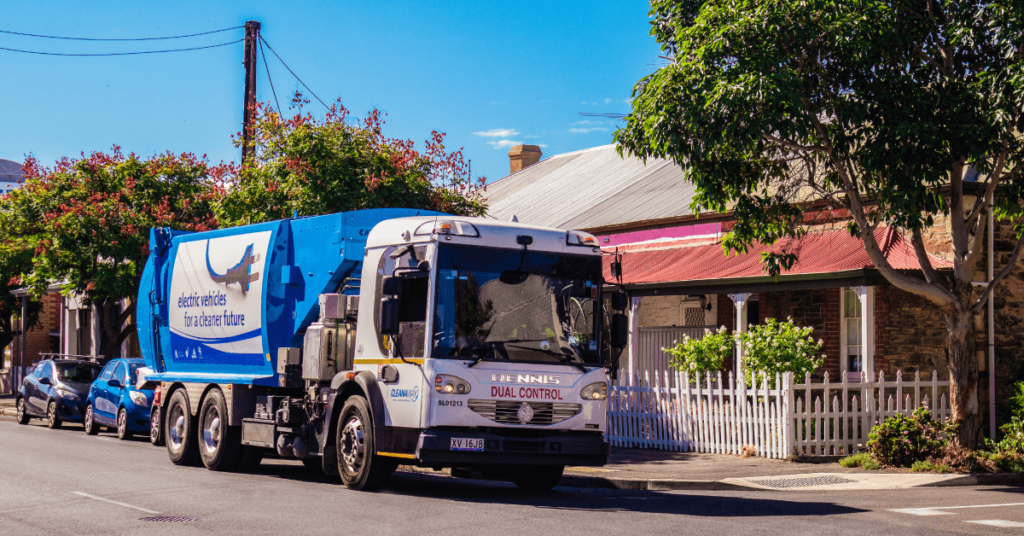
A trial of an electric waste collection truck has begun as part of a joint-council waste contract between City of Adelaide, City of Port Adelaide Enfield, City of Charles Sturt and City of Marion and Cleanaway.
The trial will investigate how feasible the electric vehicle is under actual operating conditions whist maintaining a consistent and reliable service. The trial will help the Councils determine how we might transition to electric waste collection trucks in Adelaide, as the technology matures.
The truck used for the trial is a modified 2018 Dennis Eagle truck, with side loader.
It is expected to run for 120 kilometres on active duty before needing to recharge. The truck will be charged overnight for approximately 10 hours and will take place at Cleanaway’s depot in Port Adelaide. Its actual driving range will depend on the terrain, number of stops and driving style. As well as charging from a power point, the truck captures energy from braking and stores it in a battery to power the electric motor.
Benefits of the trial include:
- This truck emits zero greenhouse gas emissions from the tailpipe under actual operating conditions.
- The vehicle is quiet. If the trial is successful it will significantly reduce noise, making early morning or late-night collections possible, which could help ease street congestion.
- Since the South Australia electricity grid now has over 50% renewable electricity supply, and is heading towards 100%, the switch to electric vehicles is a key component of a low-carbon future.
QUOTES
City of Adelaide Lord Mayor Sandy Verschoor said:
“The trial of a new electric waste truck is a fantastic initiative, and it is an example of how Councils can work together to address climate change and improve sustainability across metropolitan Adelaide.”
City of Charles Sturt Mayor Angela Evans said:
“This trial with the electric waste collection truck demonstrates our commitment to reducing our environmental footprint and carbon emissions, helping us achieve our goal of ‘Net Zero’ by 2025. We are pleased to be partnering with like-minded councils on such a great initiative.”
City of Marion Mayor Kris Hanna said:
“Smart councils are working together for a greener future. There is a lot we can do which is right for the environment and, in the long term, saves ratepayers money as well. Climate change doesn’t recognise council boundaries.”
City of Port Adelaide Enfield Mayor Claire Boan said:
“The City of Port Adelaide Enfield is excited to partner with Cleanaway and the Cities of Adelaide, Charles Sturt and Marion to trial an electric vehicle for the collection of our communities kerbside bins. It’s another great collaboration between councils and industry for positive sustainability outcomes and reducing our carbon footprint.”
Cleanaway, Conan Hookings General Manager Solids Waste Services, SA/TAS said: “In South Australia we have 150 vehicles on the road each day servicing homes and businesses all over the state. We have an obligation to keep finding ways to reduce the impact of our operations on the environment and the community, which is how we work towards Our Mission of ‘Making a sustainable future possible’. While electric vehicles reduce our carbon footprint and noise levels on the road, our focus remains on delivering a safe, consistent and reliable service to our customers.”
MEDIA CONTACTS
City of Adelaide – Matthew Halliwell 8203 7613
City of Charles Sturt – Kristie Johnson 8408 1185
City of Marion – Craig Clarke 0434 600 637
City of Port Adelaide Enfield – Chris Crago 0407 711 816
BACKGROUND
$100 million contract has been awarded to Cleanaway to service 168,000 households across four Adelaide councils.
In one of the biggest contracts of its type, Cleanaway will collect kerbside waste, recycling and organics bins from the councils of Adelaide, Charles Sturt, Marion and Port Adelaide Enfield for at least the next seven years.
The councils sought authorisation from the Australian Competition and Consumer Commission (ACCC) to jointly procure waste services. The councils released the tenders for the following services:
- Kerbside waste collection
- Receiving and processing/disposal of the various waste stream materials collected
- Ancillary Services, including bulk bin, hard waste, and street litter bin collection
The councils evaluated the tender submissions and negotiations were then undertaken to determine the preferred tenderers.
The change to Cleanaway occurred progressively from 1 May 2020, with nearly a quarter of Adelaide households benefiting from the new arrangements.
Among the benefits:
• New environmentally – friendly garbage trucks with enhanced technology (including the trialling of electric trucks) will deliver the services.
• Increased waste and recycling education to residents in a bid to reduce contamination levels, and the volume of waste going to landfill.
• Introduction of an online portal for residents to request services along with new contact details to report a missed bin collection and for other queries.
• Better tracking of garbage trucks to minimise the chance of not collecting bins.
• Collection routes designed to cross council boundaries to make it more efficient to collect bins.
Residents will be notified of any changes to bin collection schedules. The new kerbside collection service commenced on 1 May 2020 for the cities of Marion and Port Adelaide Enfield. The City of Adelaide commenced on 1 July 2021 while the City of Charles Sturt will begin on 1 May this year.
Cleanaway has also been awarded contracts for bulk bin and hard waste collections (excluding City of Marion where the service is managed and delivered by staff).
In addition, the company has been awarded a four-year contract for the processing of general waste at Adelaide and Charles Sturt Councils. Marion Council will continue to dispose of general waste via the Southern Region Waste Resource Authority. Peats Soils and Jefferies have both been successful in securing contracts for organic waste processing.
The change in waste arrangements will result in savings across all councils, which can be invested back into community services.
Cleanaway congratulates Victorian Government for Container Deposit Scheme announcement
Cleanaway congratulates the Victorian Government on choosing a container deposit scheme that provides convenience and access for the public and a variety of opportunities for charities and community groups to participate
Cleanaway congratulates the Victorian Government on choosing a container deposit scheme that provides convenience and access for the public and a variety of opportunities for charities and community groups to participate
Cleanaway welcomes today’s announcement by the Victorian Government to adopt a split responsibility container deposit scheme (CDS). This model has been shown to drive higher return rates which will kick-start a circular economy in Victoria to deliver social, economic and environmental benefits.
“Cleanaway congratulates the Victorian Government on choosing a scheme that provides convenience and access for the public and a variety of opportunities for charities and community groups to participate,” said Cleanaway’s Victorian Solid Waste Services General Manager Matt McKenzie.
The split responsibility CDS adopted by the Victorian Government, separating funding and operational roles, creates positive commercial tension and clarity of purpose for all stakeholders. Each scheme partner has distinct drivers for cost efficiency, high consumer redemption rates, good citizen access and scheme integrity.
The scheme coordinator is motivated to manage the scheme’s costs efficiently, while the network operator is motivated to increase participation and drive container returns.
Under a split responsibility CDS model Victorians can expect to see:
- High return in bottles, securing a clean stream of material for the jobs and industries in the circular economy
- Consumer convenience for returns and cutting-edge technology such as reverse vending machines
- Opportunities for charities and community groups to participate in fundraising and social enterprise activities
- Scheme transparency and accountability
- A significant reduction in litter, particularly in our waterways
Cleanaway looks forward to participating in any open market processes related to the CDS and will continue to work closely with the Victorian Government towards building a domestic circular economy and a more sustainable future.
For more information, contact:
Cleanaway:
Mark Biddulph
Head of Corporate Affairs
+61 499 332 601
Mark.biddulph@cleanaway.com.au
Cleanaway, Clean Up Australia partnership extended to 2024
We’ll be working together to encourage and demonstrate how resources can, rather than going to landfill, be recovered, re-used, recycled or become energy feedstock. This is the circular economy in action
We’ll be working together to encourage and demonstrate how resources can, rather than going to landfill, be recovered, re-used, recycled or become energy feedstock. This is the circular economy in action
Cleanaway and Clean Up Australia will continue to work together for another three years to drive a circular economy for consumer products in Australia.
Cleanaway Chief Operating Officer Brendan Gill and Clean Up Australia Chairman Pip Kiernan have announced an extension of their partnership to 2024.
“As Australia’s leading integrated waste management company, Cleanaway, is proud to support Clean Up Australia,” Brendan said.
“It is inspiring to see how this organisation, started by Ian Kiernan AO 32 years ago, has encouraged millions of volunteers, including Cleanaway staff to take to their streets, beaches, parks, bushland and waterways to remove litter and illegally dumped rubbish.
“While there is incredible community participation in their annual national day of action, we know the charity’s work continues all year round as they work with communities, governments and businesses to inspire and empower Australians to clean up, fix up and conserve the environment while tackling waste at its source.
“By extending this partnership we will continue to work together to encourage communities to operate more sustainably and engage people in being part of the solution.
“There is a groundswell of enthusiasm for recycling, driven by the way we involve communities in the process and give them the opportunity to learn by doing.”
Pip Kiernan said: “Our organisations share a core belief that prevention is better than cure, which means encouraging Australians to think about the products they purchase, including things like food and plastic packaging. We want to encourage everyone to make everyday choices that have better outcomes for the environment.
“Our aim is to help people understand that what they currently think of as rubbish needs a change of mindset. Most of the items in our bins are really wasted resources which can, if properly processed, have another life.
“We’ll be working together to encourage and demonstrate how resources can, rather than going to landfill, be recovered, re-used, recycled or become energy feedstock. This is the circular economy in action.
“Ours is an important partnership. Clean Up Australia is the voice of the Australian community and its desire to look after our precious planet and Cleanaway is the leader in resource recovery with a drive to change the way waste is defined and create a sustainable future for us all. Joining forces with renewed focus will bring about real and lasting change to the way Australian’s manage what’s in their own bin.”
Contact us to learn more about how we’re making a sustainable future possible for communities across Australia.
Cleaning up at Inkerman with new compressor
An Atlas Copco unit was selected because of its mobility and proven performance in the mining industry
An Atlas Copco unit was selected because of its mobility and proven performance in the mining industry
The purchase of a new mobile air compressor is saving time and money at Cleanaway’s Inkerman Landfill in South Australia.
The Atlas Copco compressor is being used to clean machinery including bulldozers, excavators and compactors at the tip face, avoiding the need for them to be driven to a workshop.
Branch Manager David Leaney said parts such as radiators, engine filters, tracks and rollers could become clogged with dust and other debris, leading to breakdowns in and reduced operating lives for ‘yellow gear’, unless it was regularly cleaned.
“We probably gained an extra six to eight hours of operating time in the first two weeks because tramming the machines down to the workshop can take more than half an hour in one direction,” David said.
“This is in addition to the fact that in the medium to long term, the need for maintenance is less and the equipment lasts longer.”
The benefits of regular cleaning, such as reduced lost time, were identified as part of the continuing update in yellow gear maintenance standards.
The compressor was purchased after Post Collections Operations Manager Terry Cundy and Plant Operator Thomas Sleep asked the crew for suggestions, with input from Fleet and Equipment Manager Mick Ventura.
“An Atlas Copco unit was selected because of its mobility and proven performance in the mining industry,” Mick said.
“Already the unit has proved its worth with the operators being able to blow out the filters and radiators adjacent to the face without the additional time impost and wear and tear on the machine by having to tram the machine backwards and forwards to the workshop.
“It has also been a bonus to be able to clear debris from the tracks on the face as well.”
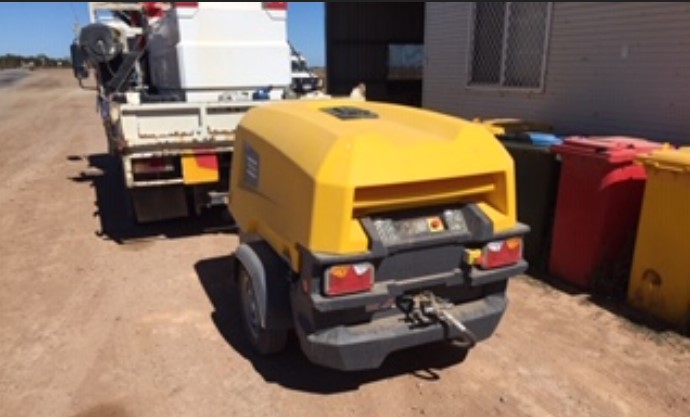
Pictured: The new mobile air compressor being delivered to our site
Lance McKay on how Ausjet drives safety for industrial cleaning in Australia
The long goal is to introduce industrial cleaning education in schools, to provide early exposure, training and a viable career pathway
The long goal is to introduce industrial cleaning education in schools, to provide early exposure, training and a viable career pathway
Business Development Manager Lance McKay is on a mission to raise the profile of the industrial cleaning industry, one of the many services offered by Cleanaway’s Industrial Services team.
Lance brings invaluable expertise to our team – as a safety champion helping our people navigate through the high-risk working environment and as an industry steward, attracting quality employment and building career pathways. Lance has 20 years of experience with high pressure water jetting and vacuum loading services in the industrial services industry, servicing contracts in municipal councils, water authorities, refinery, mining, offshore and CSG oil and gas.
Lance has served on the board of AusJet, the safety organization for industrial cleaning activities in Australia and New Zealand, for the past three years. He also represents the Australasian High-Pressure Waterjetting Association (AUSJET / ADCVA) on the Global Industrial Cleaning Coalition (GICC) Steering Committee.
In this interview, Lance speaks to Industrial Theory podcast host Kerry Siggins on the state of industrial cleaning services in Australia, his work with Ausjet and more.
Listen on Soundcloud: https://lnkd.in/gB3_2MM
Listen on Apple Podcasts: https://lnkd.in/dH-mrgi
Listen on Spotify: https://lnkd.in/dHux_ZY
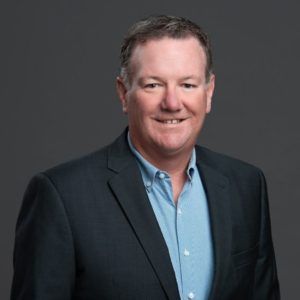
Highlights
Q: What are some of the biggest challenges within Australia and New Zealand (in the cleaning industry)?
A: Getting into mainstream – people knowing more about the industry, and to attract more people in. We’re trying to promote the industry in trade schools, so that people can see it as a career path early.
Q: What does Ausjet do to promote the advancement of safe water jetting and use of automation?
A: Ausjet would love to see the water jetting industry go fully automated. We’re trying to make our contractors more aware of the benefits of automation. It may cost a little bit more, but you’ll find out the job will done quicker and more efficiently.
Q: Does Ausjet have a training and certification programme that helps contractors get their guys certified?
A: Yes, we have an Operator course and an Operator Assistant course – entry level – which teaches you about the pumps and how to set equipment up.
Q: What is your advice for safe water jetting and industrial cleaning practices?
A: Always follow procedures and follow them correctly. Shortcuts are not necessarily the best way to go. This is how we avoid accidents.
Grasshopper Environmental receives industry-leading environmental certification
“We’re proud of this significant achievement, which follows months of preparation and assessment, and demonstrates the high standards we have maintained over our 40 plus year history."
“We’re proud of this significant achievement, which follows months of preparation and assessment, and demonstrates the high standards we have maintained over our 40 plus year history."
The newest member of the Cleanaway group, Grasshopper Environmental, has become the first construction and demolition waste management supplier company in New South Wales to be licensed by Good Environmental Choice Australia (GECA).
Grasshopper joined its parent company in being licensed by GECA, Australia’s only independent not-for-profit advisory and ecolabelling program.
The company, which provides waste management services in the building, demolition and infrastructure, and commercial and industrial sectors in Sydney and nearby regions, has been certified by GECA for waste collection services for three years.
“The GECA ecolabel is an independent ‘tick’ that shows our service is better for the environment and has been ethically administered,” said Grasshopper Environmental Regional Manager Gavin Stewart.
“We’re proud of this significant achievement, which follows months of preparation and assessment, and demonstrates the high standards we have maintained over our 40 plus year history.”
“We’re committed to not only complying with environmental regulations but operating in a safe and ethical manner and exceeding the expectations of our customers.”
Cleanaway, which acquired Grasshopper Environmental last year, has been certified for the waste collection services it provides to the Barangaroo South Precinct property development in Sydney.
GECA CEO Michelle Thomas said: “We’re pleased to welcome another member of the Cleanaway group to the family of GECA licensees.”
“Grasshopper Environmental passed through a stringent assessment process and satisfied 25 criteria to achieve certification, which sets the benchmark for environmental services.”
Contact us to learn more about how we’re making a sustainable future possible for communities and businesses across Australia.
Cleanaway receives environmental certification for Barangaroo South contract
"By becoming GECA certified, Cleanaway has demonstrated its commitment to having a lower environmental, health, and social impact. They should be proud of this achievement.”
"By becoming GECA certified, Cleanaway has demonstrated its commitment to having a lower environmental, health, and social impact. They should be proud of this achievement.”
Australia’s leading integrated waste management company Cleanaway has been licensed by Good Environmental Choice Australia (GECA) for the waste collection services it provides to the Barangaroo South Precinct property development in Sydney.
GECA, Australia’s only independent not-for-profit advisory and ecolabelling program, certificated the service under its Waste Collection Services standard.
Cleanaway’s Sustainability Manager Solids NSW Rebecca Evered said GECA certification was a requirement of the contract with Barangaroo South, one of three precincts in the $6 billion-plus billion Barangaroo redevelopment project on the edge of Sydney Harbour.
“We’re proud of this certification, which is recognition by a respected organisation that we operate to the highest environmental standards, consistent with our corporate mission of ‘Making a sustainable future possible’,” Rebecca said.
“It doesn’t change anything we do, because we already adopt best practice, but rather it was about documenting it to ensure it was clear and transparent.”
“More broadly, the certification holds everybody else across the waste management industry accountable for achieving the same high environmental standards.”
“In that sense it levels the playing field between Cleanaway and other companies, encourages them to achieve best practice, and builds more trust by customers in our industry.”
GECA’s Waste Collection Services standard sets the benchmark for environmental services and encourages best practice through 25 stringent criteria that must be satisfied, with evidence of compliance required.
This includes legislation, Waste Management Plans (WMPs), operations, chain of responsibility, staff training, and company policies, and governs collection from the point of collation to a lawful processing or disposal facility.
GECA noted Cleanaway’s certification demonstrated transparency, quality service, data accuracy for reporting, and credibility.
GECA CEO Michelle Thomas said: “We’re pleased to welcome Cleanaway to the family of GECA licensees. By becoming GECA certified, Cleanaway has demonstrated its commitment to having a lower environmental, health, and social impact. They should be proud of this achievement.”
GECA has certified more than 3,500 products and services under 18 different standards, including waste collection.
Contact us to learn more about how we’re making a sustainable future possible for communities and businesses across Australia.
Recent acquisitions further strengthen Cleanaway’s Footprint 2025 strategy
"We knew it was the right decision to partner with Cleanaway because we have a common goal."
"We knew it was the right decision to partner with Cleanaway because we have a common goal."
Australia’s leading integrated waste management company Cleanaway has continued to build its infrastructure across the waste management value chain with two acquisitions that bolster its collections business.
Cleanaway purchased waste and recycling company Statewide Recycling in December 2019 and waste management services provider Grasshopper Environmental in October 2020.
CEO and Managing Director Vik Bansal said: “These acquisitions demonstrate how we are continuing to deliver our Footprint 2025 strategy to ensure we have right infrastructure and technology across the waste value chain from collection, through resource recovery and energy-from-waste, to treatment and disposal.”
Cleanaway also purchased the Stawell landfill in Victoria from Statewide in August 2020.
Established in 2006, Statewide Recycling offers waste and recycling services to residents and businesses in western Victoria and has a transfer station at Warrnambool, depots in Stawell and Hamilton, and provides collections in Warrnambool, Stawell, Hamilton and surrounding areas.
The company has about 20 employees, 15 trucks and more than 3,000 skip bins.
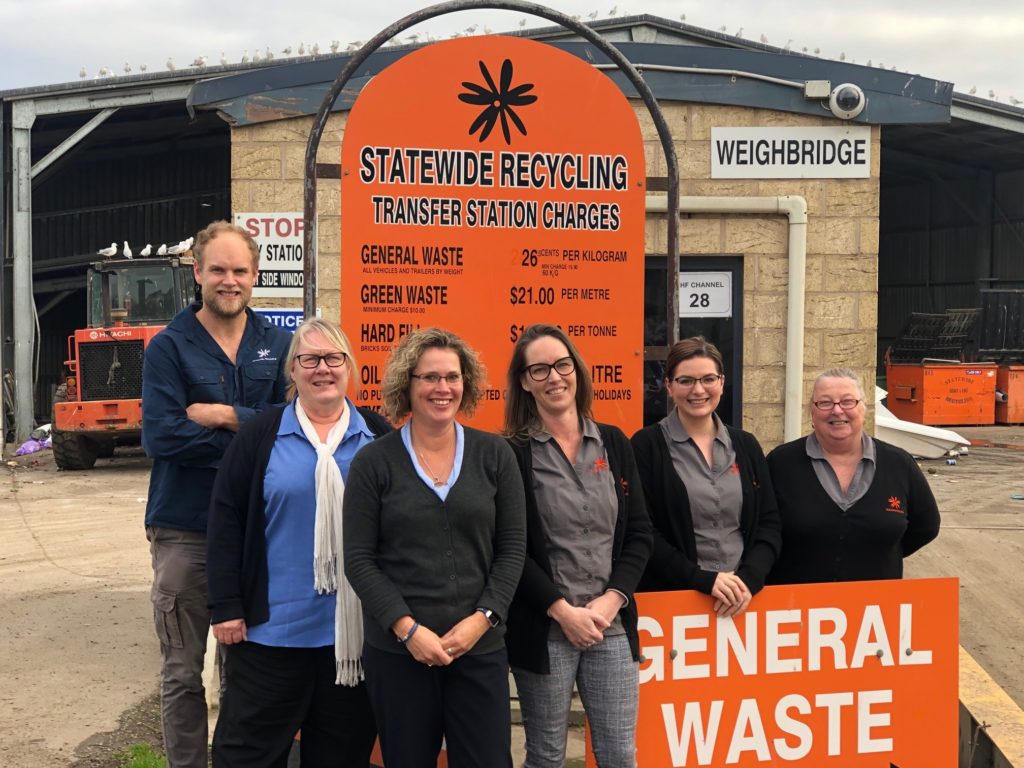
Pictured: The same friendly Statewide team continues to serve residents and businesses in the area.
Established in 1978, Grasshopper Environmental has been providing waste management services in the building, demolition and infrastructure, and commercial and industrial sectors in the Sydney metropolitan, Blue Mountains, Illawarra and Central Coast regions for more than 40 years.
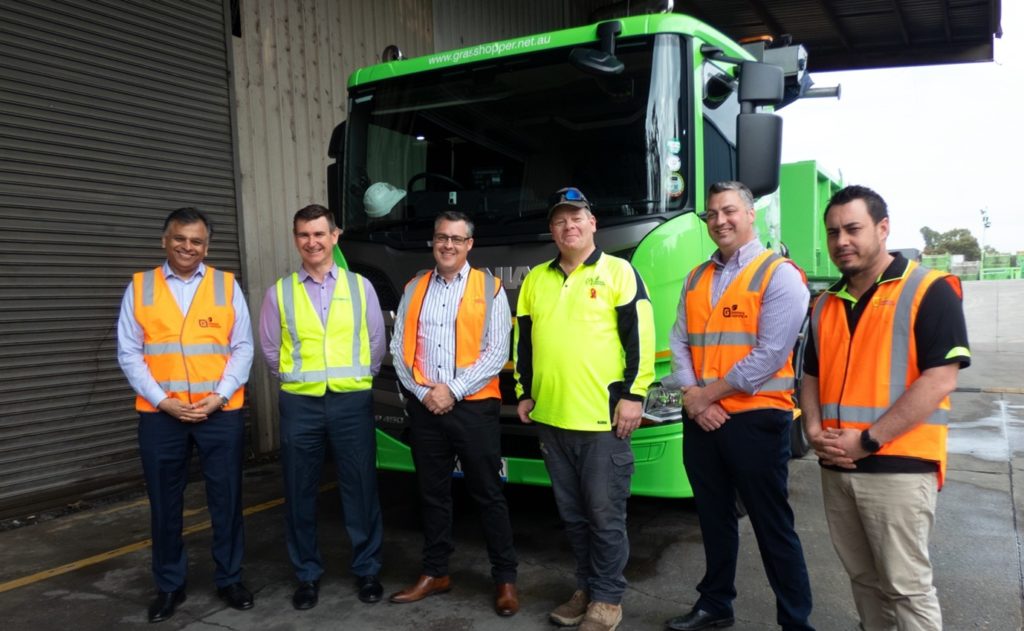
Pictured from left: Cleanaway CEO & MD Vik Bansal, General Manager Solid Waste Services, David Clancy, Grasshopper Environmental Managing Director Gavin Stewart, David Kennedy, Environmental Director Ian Stewart and Allocations & Fleet Manager Ryan Noble.
With about 50 employees, 23 trucks and 1,500 skip bins, Grasshopper services clients that include construction companies such as Lendlease, John Holland, Laing O’Rourke, FDC, Billbergia and Hansen Yuncken, governments, and hospitality, retail, manufacturing, medical and industrial premises.
Its portfolio consists of major projects such as Sydney Light Rail, Central Station Upgrade, WestConnex M4/M5 Link, Sydenham Station, Hornsby Hospital, Western Sydney Airport and the new Sydney Zoo.
Vik said Grasshopper filled a gap in the NSW market for Cleanaway, which is already the second largest player in the construction and demolition (C&D) sector in Australia, while Statewide added to its growing footprint in Victoria.
Statewide General Manager Carl Moloney said: “We’re excited to be part of the Cleanaway family and we look forward to continuing our waste and recycling services to residents, council and businesses in the Warrnambool area. Customers and residents can expect the same reliable service by our friendly staff as they are used to.”
Grasshopper Environmental Managing Director Gavin Stewart said: “We knew it was the right decision to partner with Cleanaway because we have a common goal. This is a transformational step for Grasshopper Environmental and will provide great opportunities for continued growth in the C&D sector.”
Vik added: “We reached the halfway point in the strategy in 2019 when we purchased SKM Recycling Group’s the resource recovery assets, building earlier acquisitions including industrial services and waste management business Toxfree Solutions, which included Daniels Health and provided a leading position in the medical waste sector.
”Greenfield investments such as such as the original Perth Materials Recovery Facility (MRF), transfer stations and resource recovery facilities complement value-accretive acquisitions to complete the strategy, ensuring we can play our role in sustainably meeting Australia’s waste needs and contribute to the creation of a circular economy.”
Contact us to learn more about how we’re making a sustainable future possible for communities and businesses across Australia.
How energy-from-waste technology is the missing piece in waste value chain
A cohesive national strategy and support at a Federal government level would open the door for better public understanding on the role, safety and technology of energy-from-waste facilities.
A cohesive national strategy and support at a Federal government level would open the door for better public understanding on the role, safety and technology of energy-from-waste facilities.
Population growth, increased consumption, diminishing landfill space and strict quality requirements in recycling markets are putting pressure on waste management systems. According to the latest National Waste Report, Australians are recycling 58% of waste generated, sending 37% to landfill and recovering only 2.8% through energy-from-waste technologies such as turning biogas from landfill and food waste into electricity.
Cleanaway CEO and Managing Director Vik Bansal said, “To make a sustainable future possible, Australia needs to improve source separation of materials, improve resource recovery through investment in processing and recycling facilities, and create robust local markets that use recycled materials in manufacturing.”
“What’s not discussed enough is ‘what do we do with the waste that absolutely cannot be recycled’? When used to supplement waste avoidance, reuse and recycling, energy-from-waste is the sustainable solution for this residual waste.”
In addition to relieving pressure on landfill, energy-from-waste is a lower cost option for councils and businesses to dispose of their non-recyclable waste and contributes to lowering carbon emissions. An energy-from-waste facility would reduce greenhouse gas emissions by more than 450,000 tonnes of carbon dioxide each year – the equivalent of taking approximately 100,000 cars off the roads.
“Around the world, modern energy-from-waste facilities have benefitted from years of innovation and advancements in environmental monitoring and controls. These facilities are highly engineered to minimise air pollution and protect human health.” explained Vik.
Europe has embraced energy-from-waste with well-established facilities that are an integral part of their waste management infrastructure. While energy-from-waste projects are underway in Western Australia and Victoria, incineration is banned in the ACT and in NSW, a bill was brought forward to ban the incineration of most waste in late 2020. Although it was ultimately rejected, the raising of the bill highlighted the need for wider understanding of the technology among communities.
“A cohesive national strategy and support at a Federal government level would open the door for better public understanding on the role, safety and technology of energy-from-waste facilities.” said Vik.
“In the meantime, Cleanaway will continue to invest in infrastructure across the waste value chain from collections to resource recovery, energy-from-waste, treatment and disposal. Since the launch of our Footprint 2025 roadmap to manage Australia’s growing waste needs, we’ve invested in a container sorting facility in NSW, a processed engineered fuel facility in Western Sydney and a plastic pelletising facility in Albury/Wodonga.”
“We’ve also upgraded material recovery facilities in Victoria and Tasmania and improved landfill engineering and technology in Melbourne, Adelaide and Queensland.”
“We’re planning more capital investment in the energy-from-waste space, including the proposed Western Sydney Energy and Resource Recovery Centre, and potentially similar facilities in Melbourne and Brisbane.”
Cleanaway is in the process of gaining approval for a proposed energy-from-waste facility in Western Sydney. The Western Sydney Energy and Resource Recovery Centre (WSERRC), is modelled on modern facilities overseas and aims to divert approximately one-third of Western Sydney’s red bin waste into electricity to power over 79,000 homes and businesses.
The facility will also facilitate the recovery of metals from the ash for recycling and the reuse of the ash in construction processes. Once accepting waste, the Western Sydney Energy and Resource Recovery Centre is expected to create a net reduction of climate change gases equivalent to more than 390,000 tonnes of CO2 each year.
Learn more about the WSERRC proposal here and here.
Read our article on why energy-from-waste is necessary and how it can be done safely and sustainably here.
Learn about energy-from-waste technology safety, regulations and emissions here.
Contact us to learn more about how we’re making a sustainable future possible for communities, industry and local governments across Australia.